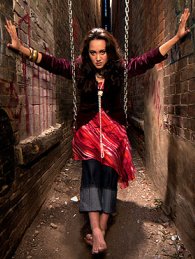Delihla
|
|
With
indigenous national origins that date
back as far as 300 AD, Delihla, a pure gypsy (Romanyi) artist, has a
cultural and musical heritage that has survived and transcended
centuries of persecution. In her heartfelt solo debut, A
Sweeter Life, it’s apparent from the intoxicating rhythmic mantra
and anthem, Gypsy, Gypsy,
the CD’s opening track, Delihla speaks for a culture that is indeed
still in search of “a sweeter life.” When
she sings, “We walk the streets alone, no place to call our own,”
you know she’s echoing sentiments of a misunderstood and maligned
existence for over some 12 million gypsies around the world who also
account for Europe’s largest minority. With
origins dating back to in
India over 1000 years ago, Delihla’s family was part of several major
gypsy dispersals to Eastern and Western Europe in the 14th
Century. Born in Budapest, Hungary, Delihla, her sister and two brothers,
learned the rituals of classic Roma
music from their parents from early
childhood. By the age of 10, she was singing and dancing with her family
in a 20-member touring ensemble with one of Hungary’s noted Roma
performers, Bongo Margit, throughout
Europe. By the time she was 16, she and
her older brother Paul, a guitar virtuoso,
were playing jazz music and performing with violinist Sonny Walker,
another Roma legend, who jammed regularly with
her father and family at impromptu gatherings in her home. Delihla’s
comfortable and sheltered existence came to an abrupt
and dramatic ending when she and her sister were violently abducted and
savagely beaten by a racist mob. Fearing
further racial repercussions, her
father sought refuge and political asylum in Toronto, Canada, where he
moved his family in 1998. At
19, Delihla, with her
brother, started performing in Toronto’s jazz
clubs, where they started to develop some local notoriety. Her
brother’s exemplary guitar skills caught the attention of guitarist,
Dave Sereny, which ultimately led to an introduction to Delihla. Floored
with her musical gifts, Sereny
immediately signed her to his fledgling
record label, Groove United. For
the past several years Delilha has been preparing for her debut, writing,
exploring, and working with different songwriters and producers to forge
her own artistic identity. That
identity went full circle, ending up
with a musical fusion of traditional gypsy music with a splattering of
jazz and modern dance beats that is infectious and irresistible to the
senses. The glue that keeps the haunting mood intact is Delihla’s
scintillating, breathy and siren-like
melodic tones and intense personal connection to the lyrical content of
each song. She expresses how gypsy
people live life: their pain, love of
family, and love for each other.
Delihla’s spirit and conviction is aptly
displayed in several classic gypsy tracks which she wrote in her native
language and in English, including the title track A
Sweeter Life, Gypsy, Gypsy,
I Love You, Gypsy Heart, and Avale La Roma,
a fun and spirited romp that urges to all gypsy men to “get up and
dance.” Sereny, along with Vikter Duplaix (Erykah Badu, Jazzanova),
Lemoyne Alexander and fellow Groove United labelmate 2nd Sun
all contributed as producers on the CD.. The
completion of Delihla’s debut CD and its ultimate release in 2005 is
bittersweet for the vivacious and inspired young singer. A year before
she completed the record, all of her family members were deported back
to Hungary. “I miss my family, but our story lives and breathes in
these songs.” On
the “sweeter”side, Delihla was granted political asylum in Canada
and her gypsy legacy will continue with her four-year old son, an
incredibly gifted drummer who seems
ready to carry on the family tradition. You
can’t help but root for Delihla in her quest for a “sweeter life,”
and when she sings, “Maybe in time things will get better, I’m
waiting for the day of change,” you realize she’s not wishing for
herself, but for her people and the whole world.
|
